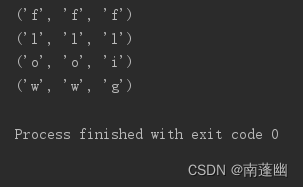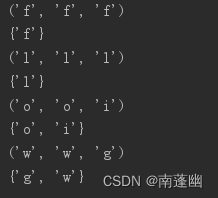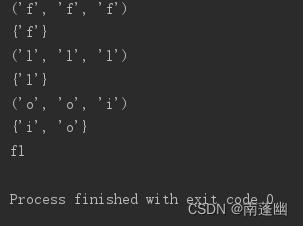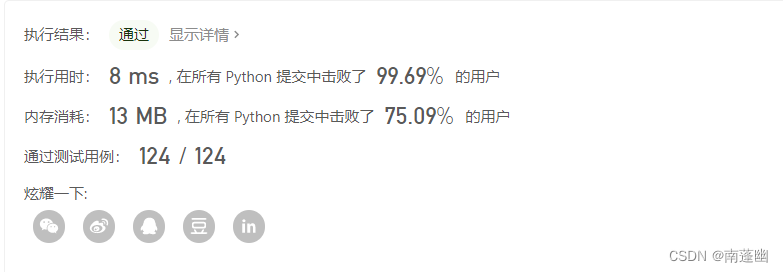-
【Python】LeetCode刷题之最长公前缀,思路1(比较单词同一位置的字符是否相同)
最长公前缀
题目
编写一个函数来查找字符串数组中的最长公共前缀。
如果不存在公共前缀,返回空字符串 “”。
示例 1:
输入:strs = [“flower”,“flow”,“flight”]
输出:“fl”
示例 2:输入:strs = [“dog”,“racecar”,“car”]
输出:“”
解释:输入不存在公共前缀。提示:
1 <= strs.length <= 200
0 <= strs[i].length <= 200
strs[i] 仅由小写英文字母组成来源:力扣(LeetCode)
链接:https://leetcode.cn/problems/longest-common-prefix解题思路
通过循环,判断列表里这几个字符串同一个位置的字符是否相同,如果相同作为前缀组成部分,不相同就结束循环并输出前面相同的部分。
判断相同可以用集合的互异性,如果这几个字符相同集合就一个字符,长度为1。
返回元组
zip() 函数用于将可迭代的对象作为参数,将对象中对应的元素打包成一个个元组,然后返回由这些元组组成的对象
strs = ["flower","flow","flight"] s = "" for i in zip(*strs): print(i)- 1
- 2
- 3
- 4

转为集合
然后将这一个个元组转为集合
strs = ["flower","flow","flight"] s = "" for i in zip(*strs): print(i) n = set(i) print(n)- 1
- 2
- 3
- 4
- 5
- 6

集合会将重复的元素去除!判断集合长度是否为1
strs = ["flower","flow","flight"] s = "" for i in zip(*strs): print(i) n = set(i) print(n) if len(n) == 1: s += i[0] else: break print(s)- 1
- 2
- 3
- 4
- 5
- 6
- 7
- 8
- 9
- 10
- 11
如果为1就作为前缀。

输出最长公前缀!代码整合:
class Solution(object): def longestCommonPrefix(self, strs): """ :type strs: List[str] :rtype: str """ s = "" for i in zip(*strs): print(i) n = set(i) print(n) if len(n) == 1: s +=i[0] else: break return s- 1
- 2
- 3
- 4
- 5
- 6
- 7
- 8
- 9
- 10
- 11
- 12
- 13
- 14
- 15
- 16
提交结果

虽然不高,不过也是一种解法!优化
def longestCommonPrefix(self, strs): """ :type strs: List[str] :rtype: str """ n = list(map(set, zip(*strs))) s = "" for m, i in enumerate(n): i = list(i) if len(i) == 1: s +=i[0] else: break return s- 1
- 2
- 3
- 4
- 5
- 6
- 7
- 8
- 9
- 10
- 11
- 12
- 13
- 14

-
相关阅读:
leetcode刷题(第四十五天)70. 爬楼梯 (进阶); 322. 零钱兑换 ; 279.完全平方数
java中springBoot+oss基础使用
记录使用 TypeScript 对数组的一些处理
MongoDB分布式文件存储系统
Scott Brinker:API对今天的Martech用户来说「非常重要」 ,但它们对即将到来的人工智能代理浪潮至关重要
架构师的 36 项修炼第08讲:高可用系统架构设计
leetcode 剑指offer49:丑数
蓝桥杯(3.3)
Docker(9)DockerFile
五魔方、二阶五魔方
- 原文地址:https://blog.csdn.net/qq_46556714/article/details/125623716